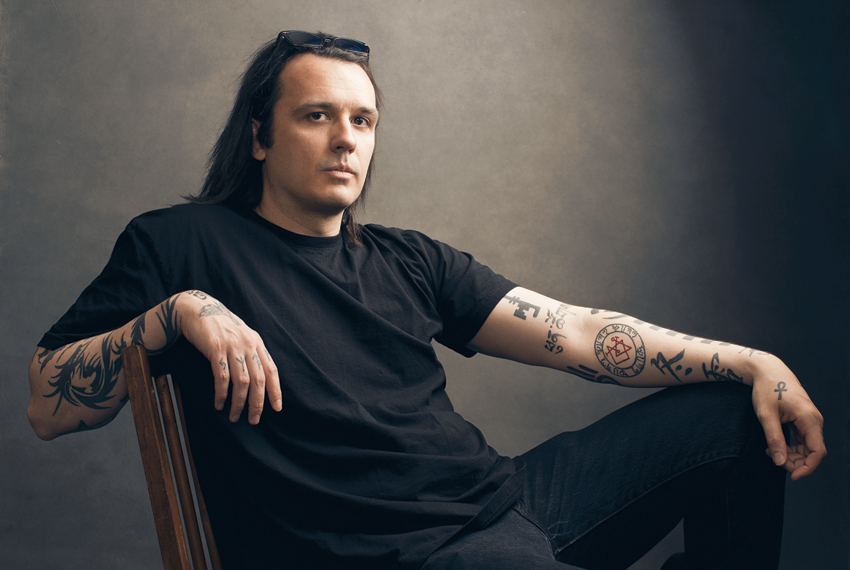Black & Blue: Damien Echols

Photo by Scott M. Lacey
He began to walk the moment he got to town, in the morning, at night, when he was anxious or bored or simply awake, through the rain and later the snow, when the city felt still and enchanted. Five months in, he still couldn’t believe he lived in Salem, the place he’d pined for ever since he was a kid obsessed with Halloween and falling leaves. He got a dog to walk with and named her Pumpkin. In his heavy black leather jacket and sunglasses, he wandered all around town, quietly but purposefully, like a ghost looking for something to haunt.
It’s hard to pinpoint when he lost his anonymity—when people started to notice, and talk—but very quickly he became part of Salem legend: Did you hear that Damien Echols moved to town? They whispered it, waiting to buy scratch tickets at 7-Eleven, in the locker room at the Y, over tea at Gulu-Gulu. Some in town were excited, fueled by stories in the local papers with headlines like “From Death Row to Witch City.” Of course, he had not expected to go entirely unnoticed. Not like he had in New York, where he’d first begun the walking as a way of burning through fear. In New York no one paid attention to anyone else, which meant he could walk the streets of Chinatown for hours and hours without interruption or incident, learning to reacclimate to humanity after 18 years in exile.
But in Salem, people took notice. They began coming up to him on the elliptical. Approaching him as he settled in with a pot of tea. Chronicling his every move. They were not always welcoming. At one point, someone etched a message into the side of a women’s bathroom stall in the East India Square Mall: “Murderers Walk Free.”
Twenty years ago, Damien Echols was one of three teenagers arrested for a widely publicized murder in West Memphis, Arkansas. Three little boys had been found dead, their bodies weirdly mangled, and the Satanic panic of the 1990s had the town in its grip. The police were so convinced that the murders had been committed by devil worshippers that they assigned the investigation a case number ending with 666. Echols, then 18, was a high school dropout with an interest in the occult and a penchant for black. He was tried and convicted—along with a friend, Jason Baldwin, and a third teen with mental disabilities, Jessie Misskelley Jr.—in a trial that later became widely viewed as a travesty of justice. Baldwin and Misskelley were given life in prison. Echols was sentenced to death.
The case received national attention thanks to the 1996 HBO documentary Paradise Lost: The Child Murders at Robin Hood Hills. Two more documentaries followed, along with half a dozen books, and tens of thousands of newspaper articles that dissected the case, turning up sloppy police work, prejudiced jurors, witnesses who’d lied under oath, and a prosecutor with a political agenda. Suddenly, the “West Memphis Three” turned into a cause célèbre. Among Echols’s legion of supporters were celebrities, especially celebrities who could see themselves in a charismatic, unapologetic misfit who read incessantly and flipped off courtroom cameras. Johnny Depp, Eddie Vedder, Peter Jackson—former outcasts all—pledged to help his cause.
Celebrities were not the only ones who became fascinated with Echols. Lorri Davis, a classically beautiful Brooklyn landscape architect, began writing to Echols after seeing a screening of Paradise Lost at the Museum of Modern Art. In 1998, she quit her job and moved to Arkansas to be closer to him. They married in 1999 in a Buddhist ceremony held at the prison, the first time they were allowed to even embrace. Getting him out became her full-time job. Eventually, she succeeded. In August 2011, Echols, Baldwin, and Misskelley took an unusual deal that allowed them to maintain their innocence but plead guilty. They were let out of prison, but forfeited any grounds on which to sue the state for nearly two decades of wrongful imprisonment. They weren’t exonerated, but they were free.
Through the entire ordeal, the specter of Salem was raised again and again, both by those who championed the West Memphis Three, and by those who condemned them. Defenders called the trial a “modern-day witch hunt.” Meanwhile, the father of one of the victims declared to a camera crew that Echols deserved to die: “I’m all for burning them at the stake, just like they did in Salem.”


